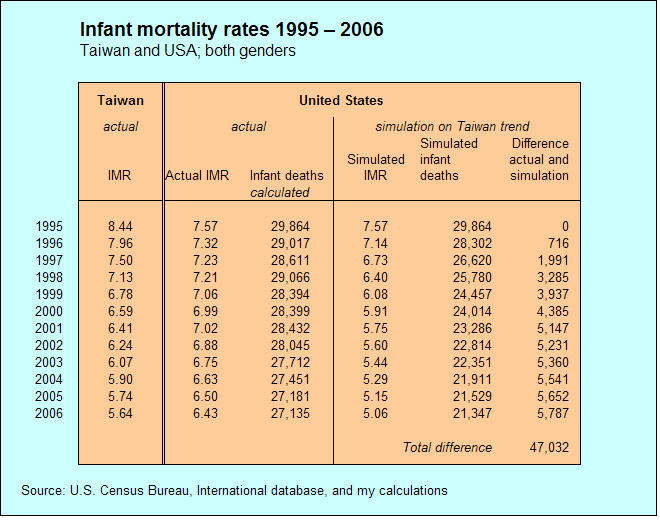|
|||||||||||||||||||||||||||
September 23, 2007
 Seek the Paths of the Dead
Seek the Paths of the Dead
The three main Democratic presidential candidates have now proposed very similar plans for universal health care, within the margin of fudge allowed any new administration. In fact it might pay them to agree on a common health care platform. Universal health coverage is very popular, so the plan sells itself to the electorate: if the Dems lose, that won't be the reason. The political problem for a Democratic President has shifted to winning the bitter post-inauguration fight in Congress with the alliance of lobbyists and Republicans who sank the Clinton plan a decade ago. The best hope of the Dems is to stoke the anger of voters at the injustice of the present mess. You want mobilisation, mass demonstrations in the Mall, scared insurance executives and politicians.
So remember the seer's advice to Aragorn in Rohan: seek the paths of the dead.
How many Americans would still be alive if the Clinton health care plan had passed in 1993-1994? We'll never know; but it's possible to do better than just "a lot".
At the same time as the USA failed to bring in universal health insurance, another country succeeded: Taiwan. Its scheme was introduced in 1995, and works well.
Compare some health indicators in the 12 years since. Life expectancy at birth rose from 75.1 to 77.4 years in Taiwan, but then so it did in the USA, from 77.8 to 79.9. If the USA had matched the Taiwan trend, life expectancy would be 2½ months longer. This would have been nice but is not huge, and the difference could be accounted for by non-medical factors.
But infant mortality (deaths in the first year of life) depends much more on medical care than life expectancy does, and it tells a different story. Taiwan made very rapid progress, reducing infant mortality by exactly a third. I worked out how many more American babies born since 1995 would have lived to see their first birthday if the USA had matched Taiwan: 47,000.

You probably can't put all the difference down to Taiwan's universal health care. But its reduction in the period was exceptionally great among advanced countries, beaten only by the Czech Republic (possible bounce-back from the trauma of de-sovietisation), Iceland (small, so statistically noisy) and Cuba (oddball), and matched by France, Greece and Japan (fn). Subject to contrary evidence, it's reasonable to attribute a fair share of Taiwan's achievement to its policies: universal health insurance, and the better organization of health care it allows.
Would it have been difficult for the USA to match Taiwan's progress, since it started from a slightly better position though it's now been leapfrogged? The required IMR of 5.1 matches that of the UK, which is a modest 19th among the 30 OECD members. The target is still a long way from the top league.
Conservative ideologue Irving Kristol, in his notorious memo of January 1994, counselled Congressional Republicans that "passage of the Clinton health care plan in any form would be disastrous". He described the American health care system as "the world’s finest".
There are at least 94,000 parents out there who might disagree.
Footnote
I took the data from the US Census Bureau
database, removing countries where the IMR was above 10/1000 in 1995,
and the microstates and colonies. The births and infant deaths were
calculated from the population and the supplied ratios, so the results
are only accurate to two significant figures. Spreadsheet here. I'd like to see the exercise reworked by proper demographers.


